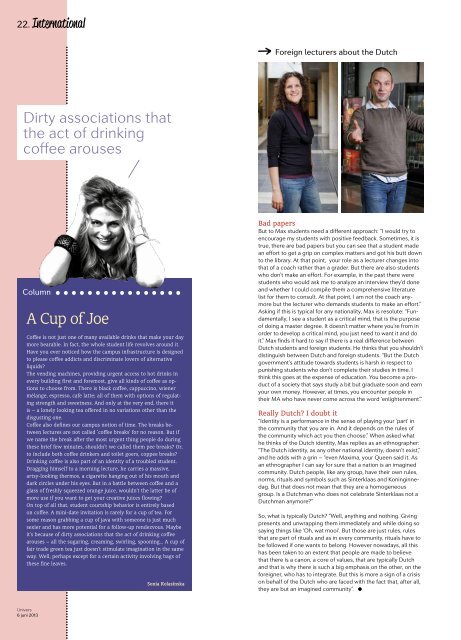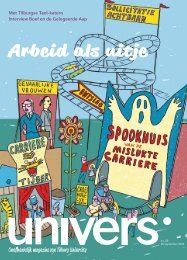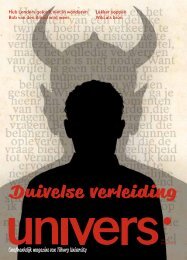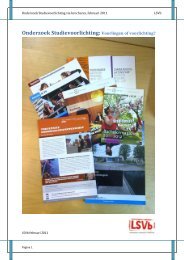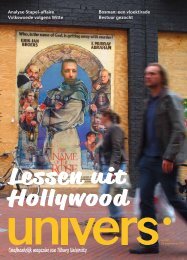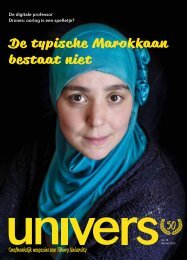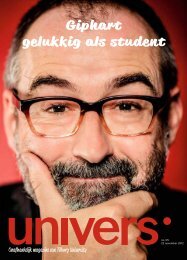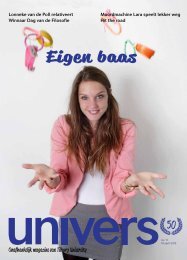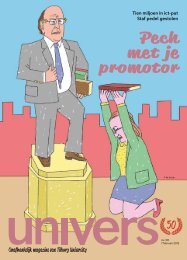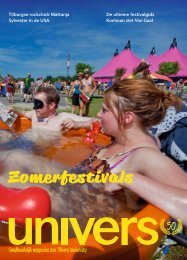Waar gaat je collegegeld naar toe? - Univers
Waar gaat je collegegeld naar toe? - Univers
Waar gaat je collegegeld naar toe? - Univers
Create successful ePaper yourself
Turn your PDF publications into a flip-book with our unique Google optimized e-Paper software.
22. International<br />
Dirty associations that<br />
the act of drinking<br />
coffee arouses<br />
Column<br />
A Cup of Joe<br />
Coffee is not just one of many available drinks that make your day<br />
more bearable. In fact, the whole student life revolves around it.<br />
Have you ever noticed how the campus infrastructure is designed<br />
to please coffee addicts and discriminate lovers of alternative<br />
liquids?<br />
The vending machines, providing urgent access to hot drinks in<br />
every building first and foremost, give all kinds of coffee as options<br />
to choose from. There is black coffee, cappuccino, wiener<br />
mélange, espresso, cafe latte; all of them with options of regulating<br />
strength and sweetness. And only at the very end, there it<br />
is – a lonely looking tea offered in no variations other than the<br />
disgusting one.<br />
Coffee also defines our campus notion of time. The breaks between<br />
lectures are not called ‘coffee breaks’ for no reason. But if<br />
we name the break after the most urgent thing people do during<br />
these brief few minutes, shouldn’t we called them pee breaks? Or,<br />
to include both coffee drinkers and toilet goers, coppee breaks?<br />
Drinking coffee is also part of an identity of a troubled student.<br />
Dragging himself to a morning lecture, he carries a massive,<br />
artsy-looking thermos, a cigarette hanging out of his mouth and<br />
dark circles under his eyes. But in a battle between coffee and a<br />
glass of freshly squeezed orange juice, wouldn’t the latter be of<br />
more use if you want to get your creative juices flowing?<br />
On top of all that, student courtship behavior is entirely based<br />
on coffee. A mini-date invitation is rarely for a cup of tea. For<br />
some reason grabbing a cup of java with someone is just much<br />
sexier and has more potential for a follow-up rendezvous. Maybe<br />
it’s because of dirty associations that the act of drinking coffee<br />
arouses – all the sugaring, creaming, swirling, spooning... A cup of<br />
fair trade green tea just doesn’t stimulate imagination in the same<br />
way. Well, perhaps except for a certain activity involving bags of<br />
these fine leaves.<br />
<strong>Univers</strong><br />
6 juni 2013<br />
Sonia Kolasinska<br />
Foreign lecturers about the Dutch<br />
Bad papers<br />
But to Max students need a different approach: “I would try to<br />
encourage my students with positive feedback. Sometimes, it is<br />
true, there are bad papers but you can see that a student made<br />
an effort to get a grip on complex matters and got his butt down<br />
to the library. At that point, your role as a lecturer changes into<br />
that of a coach rather than a grader. But there are also students<br />
who don’t make an effort. For example, in the past there were<br />
students who would ask me to analyze an interview they’d done<br />
and whether I could compile them a comprehensive literature<br />
list for them to consult. At that point, I am not the coach anymore<br />
but the lecturer who demands students to make an effort.”<br />
Asking if this is typical for any nationality, Max is resolute: “Fundamentally,<br />
I see a student as a critical mind, that is the purpose<br />
of doing a master degree. It doesn’t matter where you’re from in<br />
order to develop a critical mind, you just need to want it and do<br />
it.” Max finds it hard to say if there is a real difference between<br />
Dutch students and foreign students. He thinks that you shouldn’t<br />
distinguish between Dutch and foreign students. “But the Dutch<br />
government’s attitude towards students is harsh in respect to<br />
punishing students who don’t complete their studies in time. I<br />
think this goes at the expense of education. You become a product<br />
of a society that says study a bit but graduate soon and earn<br />
your own money. However, at times, you encounter people in<br />
their MA who have never come across the word ‘enlightenment’.”<br />
Really Dutch? I doubt it<br />
“Identity is a performance in the sense of playing your ‘part’ in<br />
the community that you are in. And it depends on the rules of<br />
the community which act you then choose.” When asked what<br />
he thinks of the Dutch identity, Max replies as an ethnographer:<br />
“The Dutch identity, as any other national identity, doesn’t exist,”<br />
and he adds with a grin – “even Maxima, your Queen said it. As<br />
an ethnographer I can say for sure that a nation is an imagined<br />
community. Dutch people, like any group, have their own rules,<br />
norms, rituals and symbols such as Sinterklaas and Koninginnedag.<br />
But that does not mean that they are a homo geneous<br />
group. Is a Dutchman who does not celebrate Sinter klaas not a<br />
Dutchman anymore?”<br />
So, what is typically Dutch? “Well, anything and nothing. Giving<br />
presents and unwrapping them immediately and while doing so<br />
saying things like ‘Oh, wat mooi’. But those are just rules, rules<br />
that are part of rituals and as in every community, rituals have to<br />
be followed if one wants to belong. However nowadays, all this<br />
has been taken to an extent that people are made to believe<br />
that there is a canon, a core of values, that are typically Dutch<br />
and that is why there is such a big emphasis on the other, on the<br />
foreigner, who has to integrate. But this is more a sign of a crisis<br />
on behalf of the Dutch who are faced with the fact that, after all,<br />
they are but an imagined community”.


